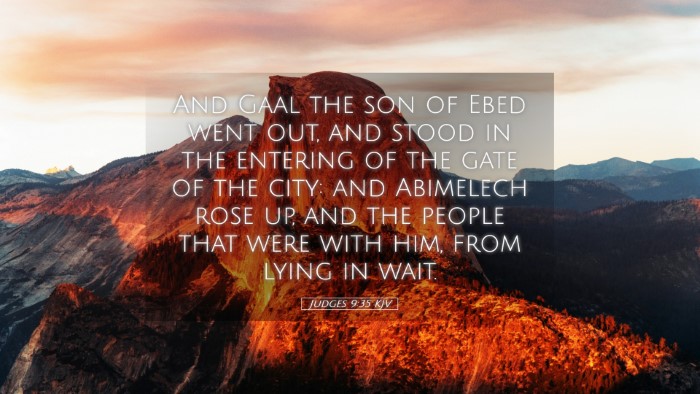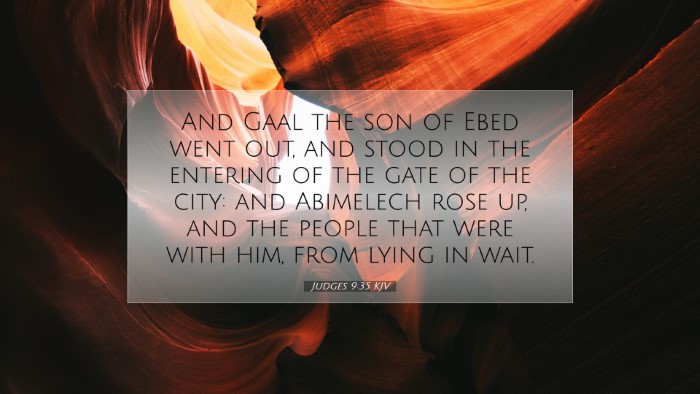Commentary on Judges 9:35
Judges 9:35 states: "And Gaal the son of Ebed went out, and stood in the entering of the gate of the city: and the princes of Shechem came, and Gaal said unto the people, Who is Abimelech, that we should serve him? and why should we serve him?"
This verse occurs in a key moment of conflict in the narrative of Judges, particularly in the account of Abimelech's rise to power and eventual challenge.
Contextual Background
The context of this verse is vital for understanding its implications. Abimelech, the son of Gideon (also known as Jerubbaal), is a figure that represents both ambition and tragedy. After Gideon's death, Abimelech's quest for kingship sets the stage for the drama in Shechem as Gaal's revolt against him reveals the fragility of human authority and the divine orchestration of events.
Analysis of Key Themes
-
The Challenge of Leadership: Gaal’s challenge to Abimelech is significant as it portrays a common motif in Judges where the leadership is openly questioned. This not only establishes Gaal’s intent but also reflects a pattern seen throughout the book where God raises up unlikely leaders.
-
Divine Sovereignty: The question posed by Gaal speaks to the larger theological theme of God's control over kingdoms and events. As noted by Albert Barnes, the motives of men are often overtaken by God’s plans, signaling that earthly power is transient.
-
Voices of Rebellion: Gaal serves as a voice of discontent, symbolizing the disassociated factions within Israel. His words ignite the flames of insurrection against Abimelech, exposing the divisions within the community.
Commentary Insights
Matthew Henry's Commentary: Henry points out that Gaal’s audacity represents a sort of divine irony; here is a man positioned to speak against a ruler who himself took the throne through devious behavior. Henry interprets this moment as a reflection of the chaos and moral bankruptcy inherent in seeking power outside of God's anointed leadership. The disdain shown for Abimelech, a usurper, serves as a broader critique of illegitimate authority.
Albert Barnes' Notes: Barnes elaborates on the implications of Gaal's statement. His rhetorical question, "Who is Abimelech?" indicates a moment of reckoning for the political status quo in Shechem. The challenge to Abimelech signifies a loss of respect among the people and a turning point where authority is questioned. This reflects the recurring theme of God reversing human expectations throughout biblical history.
Adam Clarke's Commentary: Clarke gives attention to the deliberate defiance in Gaal’s speech, emphasizing the calculated nature of his challenge. He highlights that Gaal intends not only to undermine Abimelech’s authority but also to rally the people to consider their own role in the leadership crisis. Clarke further notes that Gaal's actions lead to greater violence, showing the consequences of insurrection.
Application for Pastors and Scholars
For pastors, the narrative surrounding Judges 9:35 serves as a reminder of the nature of leadership within the church and the importance of godly authority. In a world where leaders can often be seen as illegitimate or corrupt, this text raises important questions about accountability and divine approval.
For students and scholars, Gaal’s challenge to Abimelech provides fertile ground for examining the relationship between personal ambition and divine will. It illustrates how God may choose unexpected individuals to carry out His purposes, making it essential to analyze the character and motivations of both leaders and those who challenge them.
Conclusion
In summary, Judges 9:35 not only reflects a pivotal moment in Israel's troubled history but also encapsulates ongoing themes of authority, rebellion, and the sovereignty of God. Through the insights of Matthew Henry, Albert Barnes, and Adam Clarke, this verse invites deeper exploration into the complexities of power and leadership as presented in the Scriptures.


